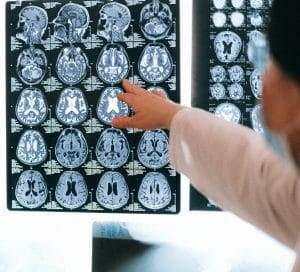Age-Related Memory Loss or Dementia?

As we grow older, changes in memory functioning may become of increased concern. When we experience memory lapses such as misplacing our keys, forgetting a name or important date, or missing a monthly bill payment, we may become concerned that such instances could be the  onset of significant memory decline, such as Alzheimer’s disease or a related form of dementia.
onset of significant memory decline, such as Alzheimer’s disease or a related form of dementia.
It is important to be mindful of the reality that minor lapses in memory can be a normal part of the aging process. Just as our bodies may start to slow down as we age, our brains follow suit. It is, however, critical to determine what may constitute age-related memory change versus changes that may be more significant and impactful to daily life.
What is Age-Related Memory Loss?
According to the National Institute on Aging, it is normal to forget things from time to time as we age. Some of these more common changes may include taking longer to learn new things, difficulty remembering new or recently learned information, or misplacing familiar items. These instances most likely constitute age-related memory change and, although they can be frustrating at times, are not often a cause for concern.
A critical element of age-related memory loss is the lack of progression in these minor changes coupled with the continued ability to maintain successful daily functioning. While changes attributed to age-related memory loss may be noticeable to us, they usually do not impact our every day lives.
Age-Related Memory Loss Versus a Form of Dementia
While age-related loss of memory and other cognitive abilities are not drastically impactful to daily life, memory impairment caused by the onset of Alzheimer’s disease or a related dementia does severely alter the ability to successfully function independently.
Additionally, because Alzheimer’s disease and related dementias are progressive, ensuring optimal health, safety and overall wellbeing becomes of utmost concern; especially for those living alone or with minimal support from family, friends, and community. Therefore, it is important to strike a clear differentiation between what is loss attributed to normal aging versus more significant concerns.
support from family, friends, and community. Therefore, it is important to strike a clear differentiation between what is loss attributed to normal aging versus more significant concerns.
The biggest differentiator between age related memory loss and a form of dementia is the frequency and severity of the noted changes and their impact on everyday life.
Some Helpful Comparisons
The following examples may provide helpful clarity in juxtaposing normal age-related memory loss versus a form of dementia:
- While driving, making a wrong turn or getting mixed up may happen from time to time. Typically, we may recognize when this occurs, self-correct the mistake, and successfully continue navigating our way. This could most likely be attributed to age-related memory loss. However, frequently getting lost driving to a familiar location, taking an excessive amount of time to drive a short and familiar distance, or making unsafe decisions that reflect poor judgment while driving may be of more significant concern.
- Forgetting to pay a monthly bill periodically could most likely be attributed to age-related memory loss. However, frequently forgetting to pay bills, overpaying bills because of forgetting that they were paid, or forgetting how to write a check or balance a check book may be of more significant concern.
- Sporadically forgetting the word that we wish to use or the name of someone familiar could most likely be attributed to age-related memory loss. However, progressive word-finding that impedes the ability to communicate may be of more significant concern.
- Forgetting an ingredient in a familiar recipe committed to memory could most likely be
 attributed to age-related memory loss, but new and extensive difficulty with following the steps of a familiar recipe, inability to adequately prepare meals, or forgetting to turn the stove or oven off after cooking is of more significant concern.
attributed to age-related memory loss, but new and extensive difficulty with following the steps of a familiar recipe, inability to adequately prepare meals, or forgetting to turn the stove or oven off after cooking is of more significant concern.
Concerned About Your Memory?
If concerns regarding changes in memory arise, it is important to proactively address as timely as possible. Scheduling an appointment with your primary care physician is a great place to start in the process of investigating lapses in memory that you find concerning.
Additional specialties that assist in the evaluation of memory changes include neurologists, neuropsychologists, psychiatrists, and your primary care physician may refer you to one of these disciplines for further evaluation, if warranted.
Many Lifestyle Interventions can Help
According to the National Institute on Aging, there are also many lifestyle interventions that you can implement to improve cognitive functioning. While these steps do not guarantee the elimination of cognitive impairment, they may help to improve brain health and, in turn, enhance daily life.
Such interventions may include:
 Diet modification: While a healthy diet may stave off many health concerns, such as heart disease or diabetes, it may also promote brain health.
Diet modification: While a healthy diet may stave off many health concerns, such as heart disease or diabetes, it may also promote brain health.
Incorporating foods such as leafy green vegetables, fruits high in antioxidants, whole grains, lean meats, or fish rich in Omega 3 are beneficial to our health. The Mediterranean and DASH diets are excellent options to incorporate into our nutritional lifestyle.
Physical Activity: Incorporating aerobic activity into our daily routine is integral to health and well-being; promoting increased energy and strength, improved balance, and reduced stress levels. Additionally, aerobic exercise increases blood flow to the brain which may support optimal brain health.
It is important that any exercise we begin remains a consistent part of our routine for best outcomes. And we should always consult with our primary care physician before beginning any new exercise regime.
Mental Stimulation: The phrase “use it or lose it” can certainly be attributed to maintaining optimal brain health. If we don’t use our brains and continue to keep them mentally stimulated, we may begin to lose critical functioning.
Engaging in activities such as word games, puzzles, reading, listening to or playing music, utilizing technology or learning a new skill are all excellent ways to keep our brains active as we age.
Social Engagement: Staying socially connected can enhance mood and well-being, reduce feelings of isolation, and can keep your brain active and engaged. Embrace opportunities to spend time with family, friends, neighbors, church, or local community.
Consider opportunities for volunteering or starting a hobby that may introduce you to a new social group. There are also many ways to remain socially connected utilizing technology, such as through Zoom, Facetime, or other platforms. Strengthening social ties helps us remain actively engaged with our surroundings and can aid in enhancing brain health.
Focusing on Wellness: Ensuring that our overall health and well-being is appropriately maintained can help ensure optimal brain functioning. Scheduling an annual physical and routine health screenings, monitoring cholesterol and blood pressure, ensuring proper hydration, refraining from excessive alcohol use, getting enough sleep, and managing stress levels are all effective ways to ensure holistic wellness which can promote the health of our brain.
It is important to recognize the concern that changes in memory may raise as we age. As we strive to maintain active, purposeful, and independent lives, any slight slip in memory may cause increased worry, stress, and the tendency to think of the worst possible outcome for our situation.
When to Seek Professional Advice
If/when such instances arise, it is important to embrace a proactive approach and seek a thorough evaluation of any changes we are experiencing. I encourage you to set an appointment with your primary care doctor. You can also think about a visit to The Abramson Senior Care Healthy Brain and Memory Center. It is one resource among others in the Greater Philadelphia area for individuals concerned about memory changes and offers several program options for evaluation.
area for individuals concerned about memory changes and offers several program options for evaluation.
The outpatient diagnostic program provides extensive psychosocial and cognitive evaluation to best determine if memory changes are age-related or more significant coupled with interventions and recommendations to live as safely and independently as possible.
Additionally, they offer a virtual program option which includes a home safety evaluation, depression and cognitive screen providing an evaluative overview of noted changes.
If you would like to learn more about the Abramson Senior Care Healthy Brain and Memory Center, click here.
Contributed by Katie Reilly

Katie Reilly works as a Care Advisor for the Abramson Senior Care Healthy Brain and Memory Center; a diagnostic and consultative program for individuals living with dementia that also provides guidance and support to family caregivers. Additionally, Katie provides education on dementia-related topics to both formal and informal caregivers as well as the community at large. Katie also serves as a volunteer for the Alzheimer’s Association as both a support group facilitator and certified community educator.
As a gerontologist with over 13 years of experience in the senior care industry, Katie is passionate about many topics related to aging, including cognitive impairment, and is a certified dementia practitioner. Katie holds a bachelor’s degree in Psychology from Gwynedd Mercy University, a master’s degree in Gerontology from Saint Joseph’s University and is currently completing a PhD in Leadership and Gerontology with a research focus on ageism within senior living communities and the significance of intergenerational relationships. In addition to her work with Abramson Senior Care, Katie works as an adjunct professor at a local university teaching undergraduate courses on aging and dementia.
Image Sources
Key in door: /www.twenty20.com/photos/1926498f-aab7-4db3-b0ca-b4a68bacf060/?utm_t20_channel=bl
Woman in kitchen: www.twenty20.com/photos/e3ec7416-3a09-4f4d-ac13-5b24ea126b26/?utm_t20_channel=bl
Man reading book: www.twenty20.com/photos/45044a37-521f-4d81-9ea0-3314f2eea4e4/?utm_t20_channel=bl
Leave a Comment
